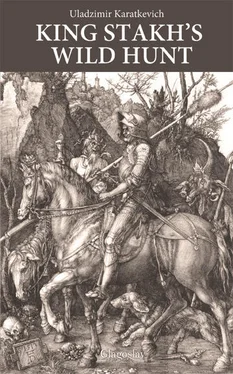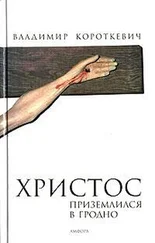The library was in the same style as the entrance hall. High arches, columned windows, armchairs covered with leather now turned brown with age, enormous closets of morain oak and books, books, and books.
Well, how can I pass them by without saying at least a few words! My heart stops beating at these memories. Ancient parchment books, books made of the first porous paper, books in which the paper had become yellow with time, paper smooth and glossy. Books of the 17th century which you can immediately recognize by their leather bindings. The red leather of the bindings of the 18th century; the wooden boards, bound with thin black leather, that covered the books of the 16th century.
And the titles, my God, what titles: “The Royal Roussian Catechism”, “An Authentic Chronicle of the Life of Jan Zbaroŭski”, “Varlaam the Indian”, “A Parable about Fame”, old “Six-Day” manuscripts, [2] Manuscripts telling of the creation of the world.
collections of ancient legends, “Gesta Romanorum” consisting of 200 stories, “Trishchan and Izota”, the Belarusian variant of “Bova”, “Apephegma”, “Speech of Mialeška”. A treasure-house! And there were newer books written in a mannered style, with long titles, such as “Cupid Contrives, or One Thousand Ways and Means an Adoring Lover Can Apply to Make His Beloved Consent to Love's Greed”.
However, quite enough, for otherwise I risk never finishing my description. I was so carried away by the books that I did not immediately notice there was another person in the room. But he, in the meantime, got up from his armchair and was expectantly looking at me. On his lips a pleasant smile, in his eyes a kind smile. With one hand on his belly he was timidly holding together the sides of his house-coat. We introduced ourselves:
“Andrej Biełarecki.”
“Ihnaś Bierman-Hacevič, the estate-manager,” his voice quiet and affable.
We seated ourselves. I looked at this man with great interest. What was it that held him in this awful place, this Marsh Firs? Money? But there wasn't any. And he, as if anxious to answer my thoughts, said:
“Look what books there are here. Because of them I am living here. I am a book-lover”
The book-lover was a small man and was badly built. His face, soft, gentle, too gentle for a man of 35, looked so lifeless, so much like a porcelain doll that it was startling. And in all respects he was too “doll-like”. Large grey eyes, long eyelashes, a straight little nose, pleasantly-formed lips. Like a little shepherd on a snuff-box... And his beard hardly grew, as was the case with many Belarusians living in unhealthy marshland.
“You are from the northern parts of Greater Miensk, aren't you?” I asked.
“Oh, the gentleman is not mistaken, yes,” he answered. “Previously I lived in a provincial city, but now here.”
Were I asked which trait stood out most of all in this little man, I should say “old-fashioned gallantry”. He was extremely well-bred, this little doll-like man, bred in the spirit of that provincial gallantry of the gentry, a gallantry that makes us laugh. When you look at such people, it seems that the children of their families, playing at hide-and-seek, hid themselves under the woollen, six-pieced skirts of their grannies, grannies who knitted stockings or darned new socks so that they should not wear through so quickly.
This impression, however, soon vanished. Something of cruelty and puritanical stand-offishness was in his eyes, in his pursed lips. But the man that he was, that could not be taken away from him. He was a real connoisseur of books. That I understood in about twenty minutes. And moreover, I became convinced that this self-taught man knew ancient literature no worse than I, a man with a university education.
Therefore I directed our conversation towards the subject of the “Wild Hunt”.
“Why does this subject interest you?”
“I am an ethnographer.”
“Oh, then, of course. However, I doubt whether my modest person can tell you about that in a way required by so lofty a guest. Perhaps better to allow the yellowed pages of the books to do that. The gentleman understands the literary language of the 17th century, doesn't he?”
With an artistic movement of his fingers (they were thin, twice as long as normal ones) he opened one of the bookcases.
And here now on my knees is an enormous volume written in a calligraphic hand in small letters turned brown with age: “The year one thousand six hundred and one knew no peace on this land. Judge Bałvanovič has only just now investigated the murder — the ferocious murder — of His Worship Januk Babajed, committed by his serfs. And in other places, too, there was no peace. The cudgel came to the city of Viciebsk, to Kryčaŭ and Mścisłaŭ, and here the serfs brought death and murder and savagery. Fourteen landowners were killed, and it was said that three more were beaten so hard that it was uncertain whether they would live.”
But it is probably too long-winded to copy this in full. Therefore I shall relate the contents of this legend in a simple way:
In those days it was not only the serfs who rebelled. The ancient Belarusian gentry, deeply offended by the new order, also rebelled. In the vicinity of Marsh Firs the situation was particularly restless. Here, in the Chadanoŭskaja virgin forest, sat the lame Father Jaraš Štamiet who supported the high-born Belarusian landowher Stach Horski, a relative through his ancestors of the Vilnia Prince Alexander. This proud young man had but one aim: to achieve independence. He had everything on his side: the royal blood which flowed in his veins, which was very important then, the support of the Greek Orthodox Church believers and the “Forest Brethren”, the talent of a warrior, and what was most important — the awful poverty, the hopeless situation of the peasantry. The young leader was already called King throughout the entire region.
He gathered his forces in the meantime, and with great diplomacy clouded the heads of the representatives of the State Power. According to the manuscript his forces already consisted of 8,000 horsemen who were hiding partly in the virgin forest, and partly in his castle.
In the late autumn of 1602 all was finally ready. In the surrounding churches the peasants took the oath of allegiance to King Stach, and with an unexpected stroke he seized the strongest castle in the district. They were only awaiting Jaraš Štamiet with his followers, and since the army was strong, and the King decisive and resolute, a bright new page might have been written in the history of Belarus.
Raman Janoŭski, a powerful magnate, the owner of Marsh Firs, was the only one who was not enthusiastic about King Stach. The King suspected that Raman had entered into reprehensible relations with the Lithuanian hetman [3] Minister of defense in Great Duchy of Lithuania, Belarusian state in Middle Ages.
and even with the Roman Church. He warned Janoŭski that that would end badly for him. Janoŭski assured him of his respect and devotion and King Stach believed him. He mixed his blood and Raman's in a goblet, and then both parties drank it. Stach presented Raman with a silver dish.
It is unknown what had compelled Raman to decide on the following move. We know, however, that he was a friend of the lawful King. He invited King Stach to go hunting with him, and the King came to him with his hunters, a group of 20 men. Shtamet was to appear at the castle the following day and there was plenty of time. The King decided to make a short delay as the object of their hunt was a very tempting animal: the marsh lynx which reminded one in size and colour of a tiger, and which at that time was already rare in our virgin forests, and afterwards entirely disappeared.
Читать дальше



